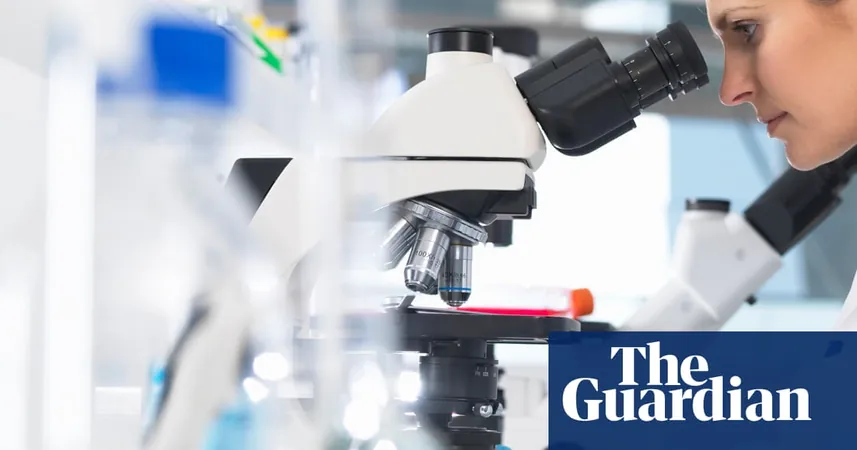
Breakthrough AI Tool Set to Revolutionize Coeliac Disease Diagnosis
2025-03-27
Author: Olivia
Introduction
In an exciting development, researchers at the University of Cambridge have unveiled an AI-powered diagnostic tool that promises to accelerate the diagnosis of coeliac disease, an autoimmune condition that affects nearly 700,000 individuals in the UK. This innovative technology could potentially transform the current lengthy and complex diagnostic journey for many patients.
Understanding Coeliac Disease
Coeliac disease results from the body's adverse reaction to gluten—a protein found in wheat, rye, and barley. Symptoms vary widely and can include debilitating stomach cramps, persistent diarrhea, skin rashes, unexplained weight loss, chronic fatigue, and anemia. Without proper diagnosis and management, individuals risk developing severe complications such as malnutrition, osteoporosis, infertility, and an elevated risk of certain cancers.
Current Diagnosis Process
Currently, diagnosing coeliac disease involves a two-step process: a blood test checking for gluten antibodies followed by an endoscopic biopsy of the small intestine. Pathologists analyze biopsy samples for damage to the villi, the small hair-like structures critical for nutrient absorption. This process can be time-consuming, often resulting in delays of several months for patients awaiting results.
AI Diagnostic Tool
However, the new AI tool changes the game. Trained on over 4,000 biopsy images sourced from five hospitals and various scanning equipment, the AI algorithm demonstrated diagnostic capabilities on par with experienced pathologists while significantly reducing the analysis time to mere minutes. The study published in the New England Journal of Medicine AI highlighted that while a pathologist typically spends five to ten minutes per biopsy, the artificial intelligence can render results almost instantly—potentially in under a minute.
Expert Opinions
Elizabeth Soilleux, a consultant haematopathologist and one of the senior authors of the study, expressed optimism about the implications of this technology. “The healthcare system is under significant strain, which often leads to lengthy wait times for accurate diagnoses. With AI, we could not only speed up the diagnostic process but also alleviate pressures on NHS waiting lists, allowing pathologists to focus on more complex cases," she noted.
Dr. Florian Jaeckle, another co-author, elaborated on the advantages of AI in diagnosing coeliac disease. He pointed out that traditional biopsy tests are often deprioritized in the lab queue, leading to frustrating delays for patients. “With our AI model, results could be delivered immediately after scanning the biopsy, effectively eliminating waiting periods for patients,” he stated.
Support and Future Implications
The research received backing from notable organizations including Coeliac UK, Innovate UK, and the National Institute for Health and Care Research, underscoring the importance of this innovation in the healthcare landscape.
Dr. Bernie Croal, president of the Royal College of Pathologists, praised the findings, emphasizing that this AI tool could revolutionize coeliac disease diagnosis, enhance health outcomes, and ultimately reduce patient wait times. "While this development is promising, it's crucial to ensure that the integration of AI into pathology is implemented safely and effectively, which will require further investment in training and technology,” he added.
Conclusion
As the healthcare sector grapples with challenges, advancements in artificial intelligence not only hint at brighter futures for patients with coeliac disease but also signal a shift towards a more efficient and responsive medical system. Stay tuned as this story evolves—it could change the lives of thousands awaiting diagnosis!









 Brasil (PT)
Brasil (PT)
 Canada (EN)
Canada (EN)
 Chile (ES)
Chile (ES)
 Česko (CS)
Česko (CS)
 대한민국 (KO)
대한민국 (KO)
 España (ES)
España (ES)
 France (FR)
France (FR)
 Hong Kong (EN)
Hong Kong (EN)
 Italia (IT)
Italia (IT)
 日本 (JA)
日本 (JA)
 Magyarország (HU)
Magyarország (HU)
 Norge (NO)
Norge (NO)
 Polska (PL)
Polska (PL)
 Schweiz (DE)
Schweiz (DE)
 Singapore (EN)
Singapore (EN)
 Sverige (SV)
Sverige (SV)
 Suomi (FI)
Suomi (FI)
 Türkiye (TR)
Türkiye (TR)
 الإمارات العربية المتحدة (AR)
الإمارات العربية المتحدة (AR)